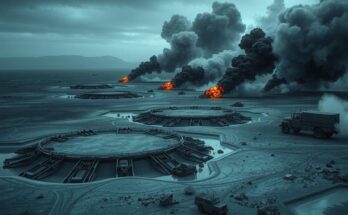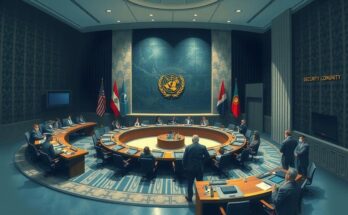The eastern DRC has been embroiled in conflict for over 30 years, particularly following the 1994 Rwandan genocide. Currently, the M23 rebel group is clashing with the Congolese government in Goma. Rwanda’s alleged support for the M23 complicates the situation further, as historical ethnic tensions and resource control fuel the ongoing violence.
The eastern Democratic Republic of Congo (DRC) has experienced ongoing conflict for over three decades, stemming from the aftermath of the 1994 Rwandan genocide. This region, rich in minerals, has been a battleground for numerous armed groups vying for power and control over its valuable resources. The instability has drawn in neighboring countries, leading to significant regional turmoil, particularly during the 1990s when it witnessed two massive conflicts, often referred to as Africa’s World Wars, resulting in millions of fatalities.
Currently, the M23 rebel group has advanced into Goma, a critical city with a population exceeding one million, located near the Rwandan border and Lake Kivu. This city serves as a crucial hub for trade and transport, proximity to mining towns rich in commodities such as gold, tin, and coltan, essential for mobile phones and batteries. While M23 claims control over Goma, the Congolese government insists its forces maintain hold over several key locations within the city.
The M23, led predominantly by ethnic Tutsis, declares its armed struggle as a means of safeguarding the rights of this minority group. The group’s name is derived from a peace agreement signed on March 23, 2009. Following its formation in 2012, the M23 rapidly expanded its territory and briefly captured Goma, facing widespread accusations of war crimes and human rights abuses. They were subsequently ousted from Goma and the DRC by the military, leading to their integration into the national army under promises of Tutsi protection, promises that they now claim have been violated since their resurgence in 2021.
Rwanda’s involvement in the conflict has come under scrutiny, with persistent allegations of its support for the M23. Various UN reports have accused Rwanda of supplying arms and logistics to the rebels since 2012. Both the Congolese government and nations such as the United States and France have corroborated these accusations, with reports indicating the presence of Rwandan troops fighting alongside the M23. Rwanda, while not directly denying such allegations, argues that ongoing fighting presents a threat to its national security and blames Congolese authorities for the escalation due to their refusal to engage with the M23.
The roots of the current violence can be traced back to the Rwandan genocide, which resulted in the deaths of approximately 800,000 individuals, primarily from the Tutsi ethnic group. This led to a significant influx of Hutus into the DRC, heightening ethnic tensions, particularly against the backdrop of the marginalization experienced by the Banyamulenge Tutsis. Over the decades, Rwanda has twice intervened militarily in the DRC, citing the need to address threats from Hutu groups, including the Democratic Forces for the Liberation of Rwanda (FDLR), which still operates in the region and is viewed as a national security threat by Rwanda. Rwanda’s military presence is often seen as a means to secure its interests in the DRC’s mineral wealth, further complicating the already fragile situation.
The conflict in the Democratic Republic of Congo, particularly in its eastern regions, has deep historical roots linked to the Rwandan genocide of 1994. As ethnic tensions unfolded, armed groups emerged, vying for control over rich mineral resources. This ongoing unrest has resulted in foreign interventions and numerous violations of human rights, as regional players expand their influence in pursuit of political and economic gains. The involvement of neighboring countries, particularly Rwanda, adds complexity to an already intricate situation defined by its historical context and ongoing clashes between various factions.
In summary, the conflict in eastern DRC is marked by a complex interplay of historical grievances, territorial wars, and resource struggles. The ongoing fighting led by the M23 rebels in Goma signifies not only a local rebellion but also a reflection of broader regional tensions, particularly concerning Rwanda’s alleged involvement. Addressing these issues necessitates an urgent dialogue among the parties involved, alongside international mediation efforts, to move towards a sustainable peace.
Original Source: www.bbc.com




